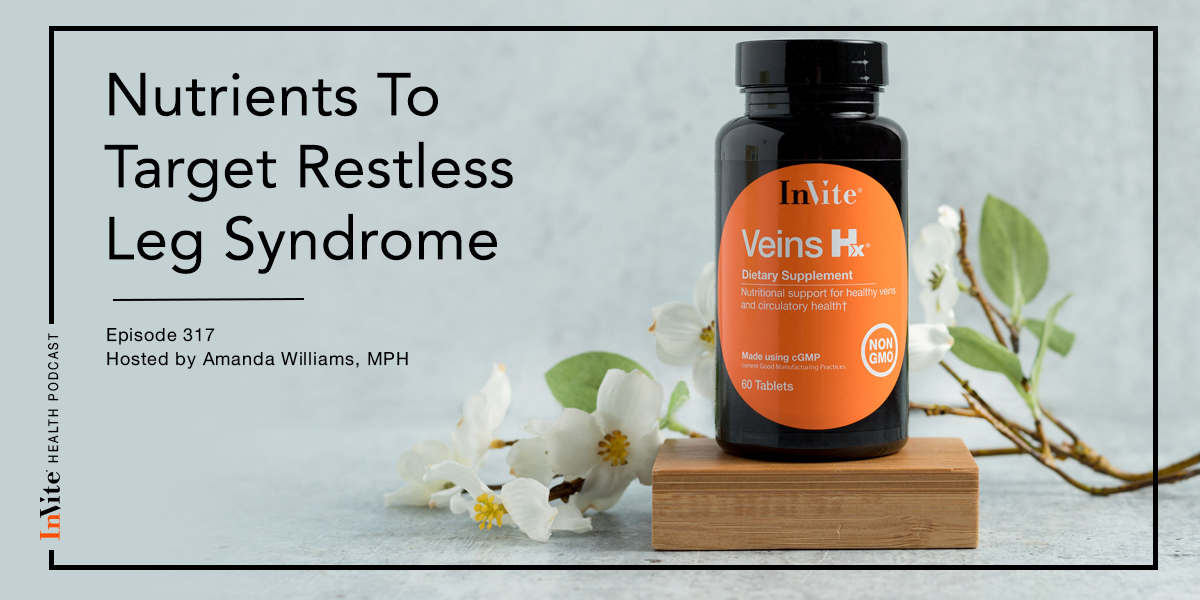Nutrients To Target Restless Leg Syndrome – InVite Health Podcast, Episode 317

Invite Health Podcast, Episode hosted by Amanda Williams, MPH
Subscribe Today!
Have you ever heard someone complain about restless leg syndrome? Maybe you’ve wondered to yourself what that was. Does that mean your legs are just flailing around? I want to talk about restless legs today, including statistically how many people it affects and what you can be doing nutritionally if you happen to be affected by this or maybe you know someone who is.
What is restless leg syndrome?
What we do know about restless leg syndrome is that roughly 10% of adults suffer from this in the United States. It is a newer phenomenon, but it actually has been researched quite extensively over the past couple of decades. They now recognize that restless leg syndrome is actually a neurological condition that causes this irresistible urge to move the legs.†
This can be triggered by many different things, but we do know that it’s unpleasant and can even have painful throbbing or pulling feelings within the legs. This sensation that people complain about is quite real and what they are dealing with is incredibly problematic because it can disrupt their sleep and it can affect them throughout their day.†
Why Sleep Is Required For Memory – InVite Health Podcast, Episode 296. Listen Now >>
Factors that contribute to restless legs
I want to talk about what you can be doing in terms of dietary and lifestyle modifications that may help to promote a more comfortable leg environment throughout the day.†
One thing that we recognize is that the Standard American Diet is a factor in creating this issue. The high sugars, bad carbohydrates and starches that most Americans are consuming on a regular basis are a major problem. Certain stimulants such as caffeine may be exacerbating restless legs, along with the really bad foods they are eating.†
There are many natural interventions that can be beneficial for those who are suffering from restless leg syndrome, including iron. Low iron levels are a really big problem. Iron deficiency or iron insufficiency can become a major factor in the role in which the pathogenesis of restless leg syndrome actually presents itself. They have been able to indicate that those who have been diagnosed with restless leg syndrome often have an iron deficiency, so iron supplementation is usually started with those patients. I turn to things like our Iron Plus Hx formulation, which contains iron as its protein form called bisglycinate. This is much easier for the body to absorb and it doesn’t cause those GI disturbances often associated with other forms of iron like ferrous sulfate.†
Researchers also recognize that low levels of folate may be playing a role in the exacerbation of these symptoms, which is why, when you’re using our Iron Plus Hx formulation, it also contains folic acid. This is really beneficial because if you have a tendency to have that low folate, then we know that this is another main reason as to why you are suffering more of those significant symptoms.†
How to help with restless leg syndrome
We can certainly look at things that would help to promote proper vascular flow, like grape seed extract, for example. Horse chestnut, which you find in our Veins Hx, can also be helpful. Oftentimes, when I talk to people who have issues with restless legs, I make sure that they are taking a good, comprehensive multivitamin, such as the Core Multivitamin, but then they are also taking Veins Hx, Iron Plus Hx and magnesium.†
Grape Seed for Healthy Circulation – Invite Health Podcast, Episode 22. Listen Now >>
Tune into the full podcast episode to hear more of Amanda’s recommendations for facing restless leg syndrome.
Thank you for tuning in to the Invite Health Podcast. You can find all of our episodes for free wherever you listen to podcasts or by visiting www.invitehealth.com/podcast. Make sure you subscribe and leave us a review! Follow us on Facebook, Twitter and Instagram at Invite Health today. We’ll see you next time on another episode of the Invite Health Podcast.


